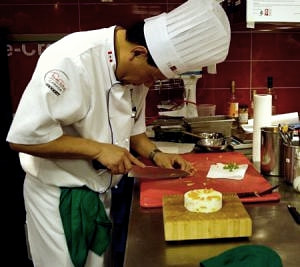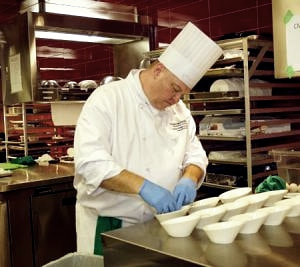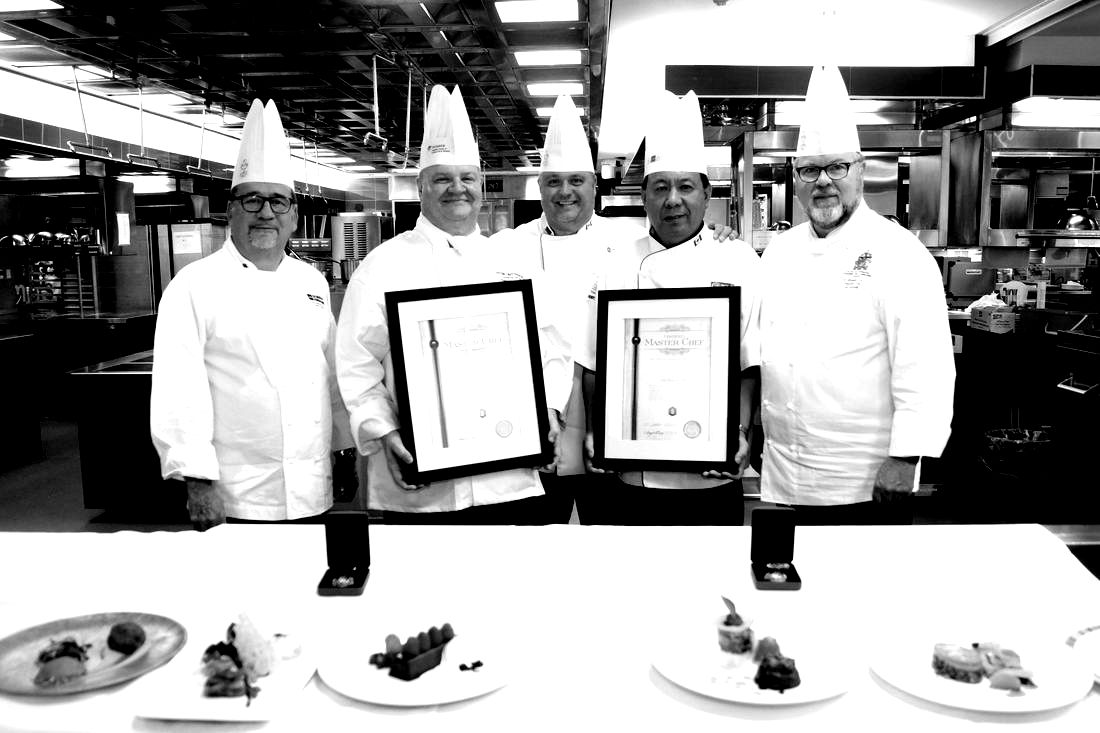|
By Gregory Furgala | Photos courtesy of Shonah Chalmer It had been a gruelling 12-hour day in the kitchen. Oliver Li had just finished the first of five days of exams in his second and last bid to earn his Certified Master Chef designation, Canada’s highest and most challenging culinary certification. He failed on his first attempt, which was galling enough, but what made it worse was his mentor, Albert Schnell, the retired executive chef at Hilton Toronto and Canadian culinary legend, oversaw the exam and watched Li fail knowing he could do better. Li didn’t tell Schnell he was trying again; he planned to tell him if he passed. When Li got home that evening, he sat heavily in front of his computer and opened his email. There, near the top, was the message notifying him that the 83-year-old Schnell had unexpectedly died. It was a blow for Li, who had known Schnell since arriving in the Toronto Hilton’s kitchens 18 years ago from Shanghai by way of a three year stint in Germany. With no family or friends in the city, Li quickly became close to Schnell, who encouraged his chefs work toward the right certifications to keep moving up, which Li did, earning his Red Seal and Certified Chef de Cuisine designations — both points of professional pride, but also concrete evidence that Li was succeeding in his adopted country. Years later, after leaving the Hilton to teach at George Brown College, Li decided to go for his Master Chef certification, once again encouraged by Schnell. “Albert never really told me to do it, but I could feel that he wanted me to take it,” says Li. When he failed and considered dropping out, it was Schnell who told him that he had to finish, that everyone knew he could do it. Li and his apprentice talked about Schnell’s death the next morning, both reflecting on how the best feeling in life is bringing happiness to others. The mood was sombre, but he still had four days of exams left, and he only had one more shot. Li turned to his apprentice: “Let’s get this done.” Back in the Kitchen Shawn Whalen, executive chef at the InterContinental Toronto, took the exams alongside Li, re-acclimating himself to cooking on line as he designed his menus for the big day. “Most executive chefs spend their time in the in the office,” Whalen says, laughing. “I had to get my sea legs back in front of the stove.” Whalen has long had an ambitious streak. In 1990, at 25, he was one of the youngest chefs to earn the Certified Chef de Cuisine designation. He captained the Canadian National Culinary Team from 2001 to 2005, winning three gold medals and one silver in the Cold Buffet Category at the 2004 Culinary Olympics along with a bevy of other awards and wins in other culinary competitions. Before taking over the InterContinental’s kitchens in 2013, Whalen ran his own culinary college. For him, enrolling in the Master Chef program was almost inevitable — there’s no sense resting on your laurels when there’s room to grow, and there’s always room to grow. “My whole career has been putting it on the line,” says Whalen. This program — Canada’s toughest culinary accreditation — was just the next logical step.' Whalen, who got his sea legs back, describes the week of exams succinctly: “It was one of the hardest, most difficult challenges in my career.”  The Program The Canadian Culinary Institute’s Certified Master Chef program, which is administered under the auspices of the Culinary Federation, demands a minimum two year commitment, requires participants to finish in four years (Whalen, who started in 2011, was allowed some time off) and allows only two attempts at passing. Before aspiring masters cook anything, they have to pass seven theory exams, including on expected subjects like garde manger and baking, to the unexpected, like kitchen design and entrepreneurship. Chefs are then put through a rigorous series of four practical exams that they have to pass sequentially, including on garde manger, baking and pastry, food styling and presentation, and vegetarian and nutritional cuisine. Last August, when Li and Whalen took the exams, they put in five 12-hour days, one after the other — and that’s on top of losing entire days and evenings reading, writing, testing and troubleshooting leading up to them. It’s not an educational program, but a gauntlet. “You virtually put your family life away,” says Li. Nothing is ad hoc. Everything is scheduled, from ordering ingredients to preparing to plating. For the garde manger exam, Whalen and Li received a list of ingredients eight weeks prior to the exam, including three mandatory proteins, that they had to use for service for eight. Two weeks before the exam, they had to submit their requisition forms, locking in their ingredients — nothing else is allowed past that. If the wrong quantities or wrong ingredients are delivered, chefs take it up with delivery person — an unwelcome potential bonus round. After that, there’s no borrowing, no begging. Chefs hit their marks, which are numerous and specific, or fail. For the garde manger exam, that meant 14 dishes for 8 people — more than 100 portions of food. The criteria for the other exams are similarly daunting, requiring menus, requisitions, organization and execution, and evaluation is constant. Chefs need to cook cleanly and maintain thorough hygiene throughout. It’s just the food being judged, which obviously has to be nuanced in taste and flawless in presentation; every process that brings a dish from concept to completion is being scrutinized, and chefs only have one shot at everything.  That looming, omnipresent fact can amplify the small mistakes. Li was especially familiar with the fact, having made enough of them previously to tank his exams, and now Whalen made a few of his own. One of his breads didn’t come out correctly, requiring last-minutes adjustments to turn out a servable product that, by Whalen’s admission, wasn’t as good as it could’ve been. Points docked. The same small mistakes that aggregate in kitchens every day were made during the exams, and each one was dealt with as it came. Even with the preparation they had put in, disaster might strike. “We all have bad days,” says Whalen. Given the pressure, one could easily have one during the exam. Master Chefs
Fortunately, neither did. Their preparation kept any mid-exam drama at bay and Li and Whelan earned their Master Chef certifications, becoming only the fourth and fifth chefs in Canada to do so. Despite the rarity of the achievement, and the effort they each put into getting it, neither expect any grand changes in their day-to-day, but neither of them took on the certification expecting them. For Li, he wanted to make good on his mentor’s belief in him, and can take some solace in knowing that he would have. He wanted the piece of mind knowing that, even if he failed a second time, he had given it his all and that it just wasn’t meant to be. He admits he’s competitive person — you’d have to be to go through this — and that he wanted to show that he’s still a great chef. When he got his Red Seal certification, it was in part to show he could make it in Canada. Now, he hasn’t just made it; he’s at the top. And like Schnell, he wanted to motivate the young cooks looking up to him. “I want to inspire my students,” says Li. “You’re in this trade, you want to do the best you can and never stop learning. Don’t be afraid of mistakes and failure — it’s part of the learning process. I’m big on walking the talk. My students know I know what I’m doing.” Whelan observes that, maybe at some point in the future, the Master Chef designation will open professional doors, but right now the program is still too young to be life changing — along with his ambitious streak, it’s what drove him to it. “The CMC is a big education initiative for the Culinary Federation,” says Whelan. “It’s a building block and a cornerstone.” Its legitimacy as a certification depends on enough people getting it and the foodservice industry recognizing it and regarding it appropriately. It’s a proving ground for Canada’s best and concrete evidence of a chef’s knowledge and skill. Whelan’s day-to-day is running InterContinental’s kitchens, but his larger role is closer to his previous job running his own culinary school: facilitating the talent of young cooks in the industry, fostering their development and sustaining and advancing the industry as a whole. Li and Whelan’s entries into the Master Chef program were part personal and part universal. Li’s’ project of succeeding in Canada that started with his Red Seal certification and the encouragement of one of his first boosters were his vectors in. Whelan’s confidence and almost reckless impulse to stake his reputation on the next big challenge lead him to the newly-minted CMC. Both, however, had necessarily cultivated the drive that kept them carried them through the countless hard hours leading up to the test, and then through that marathon week itself. Elite athletes and top business people share the same determination, even obstinance. As Li put it, felt they needed to walk the talk.
0 Comments
Leave a Reply. |
AuthorWrite something about yourself. No need to be fancy, just an overview. ArchivesCategories
All
|
ENG | FR



 RSS Feed
RSS Feed
